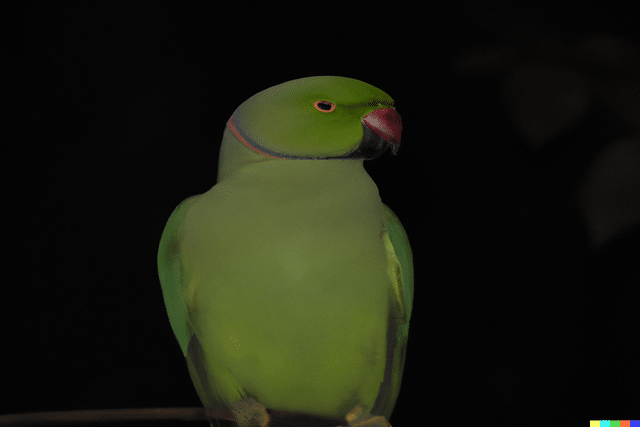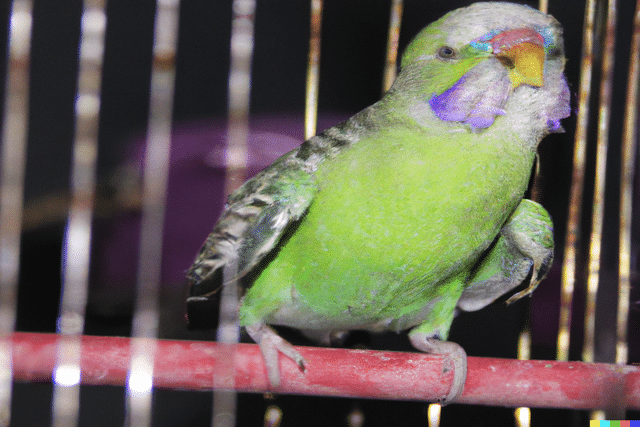Parakeets are friendly pets. Parakeet is emotional and sensitive. The way they can be friendly with you and they also get emotional. So sometimes at midnight, you can face your budgies behaving abnormally or behaving like something happening bad to them. So it can be for night fright in parakeets. So today we will dig deeper into how we discover if your parakeet has night fright and how we can prevent night fright in parakeet.
What is night fright in parakeets?
Any kind of scary or disturbing thing that your parakeet get afraid of it. For that, your parakeet can puff up their feathers, open their eyes wider, lose their balance from their perch, flutter around the floor of their cage, and interact with their toys and perches energetically.
So sometimes they also can get injured when they get afraid and break their feathers.

So what causes night frights in parakeets?
Identifying the reason behind night fright can be hard as they cannot explain by themselves. We need to notice and observe their behavior.
Here are most of the noticeable reasons:
Sleep disturbing of parakeets: Parakeet Sleep
Incomplete sleep can be a reason. Parakeet needs 12 hours of sleep each day. So if they can’t get sleep properly they can get stressed and disturbed that is why they get night fright.
Noisy place, and vehicle horns
The most one of the reasons is cars, trucks Hons. If a parakeet sleeps at night and suddenly they can hear cars trucks and any kind of noise then it can get scared.
So that’s why you have to keep them away from noisy places.
Depression or trauma
Parakeet is friendly. Sometimes two parakeets get close and they have strong bonding. If suddenly they have to leave each other then they can get depressed or trauma. Also, they feel sad.
Loneliness in Parakeet
Parakeets always love hanging out with their fellow budgies. These little birds are accustomed to living in groups of even up to 100, finding a lot of solace in each other’s company.
When a budgie is all by itself, it can get pretty stressed out, and this can even result in more frequent nightmares. If your budgie tends to have some rough dreams, not having a feathered friend around can make those unsettling experiences happen more often.
Night Thunder and lightning
When it comes to thunder and lightning, birds that are already wary of bright flashes might have an even tougher time. The sudden sounds and bursts of light from natural phenomena can really unsettle our feathered friends, especially if they’re caught outside.
Change of parakeet house environment
A new budgie is likely to experience more nighttime scares, especially during the initial nights. This holds true if you’ve just brought your budgie home for the first time or if you’ve relocated it to a different cage.
The change can be stressful for the budgie, as it’s not yet accustomed to its surroundings and isn’t sure about potential threats. This heightened sense of alertness can impact the quality of its sleep.
Parakeet Hormonal Changes
Breeding and hormonal changes can be reasons will be night fright.
Keep away from other pets
If you have other pets like cats or dogs then you have to take them away from them. Cause they can make noise at midnight and parakeets get night fright.

How to Manage Night Fright in Parakeet
Now we will share how can we handle night fright in a parakeet. In the middle of the night, if you woke up and see your parakeet having night fright then first of all you have to remove the shadow, blank on the cage. Also, you have to turn on the light so they can look around and that there is no scary thing.
Try talking with them to calm down
TO feel safe, you can talk with them. So they can understand your presence and feel safe.
Lighting on
Most of the cases, Parakeet like to sleep in darkness. So you have to observe if they are getting disturbed lighting. you can turn on a dimmed light in their room.
Need Quite a Room for Parakeet
Sometimes, draping a cover over the budgie’s cage can prevent it from spotting movements across the room.
Nonetheless, budgies remain sensitive to sounds of motion. When they can’t discern the origin of these nocturnal stirrings, they might experience night frights. It’s crucial to ensure a tranquil and uninterrupted environment in the room throughout the night.
If you reside in a noisy area, consider soundproofing the room. For example, if your home is situated near a bustling highway, you could set up acoustic panels on the walls to absorb the clamor. Hanging sound baffles from the ceiling can also help deflect incoming noises.
Taking care of any holes or cracks in the walls could prove advantageous. For a more direct approach, consider bolstering the walls and doors of the bird cage with padding during the night to increase their mass.
Consistent Sleep Schedule:
Try to maintain a consistent sleep schedule for your budgie. Having a routine for when you cover and uncover the cage can help reduce stress and anxiety.
Cage Placement For Parakeets
Place the budgie’s cage in a quiet and secure location where it’s less likely to be disturbed by sudden noises or movements during the night.
Parakeets need time to adjust to their surroundings, so avoid suddenly relocating their cage to an unfamiliar place.
Veterinary Care:
Regular check-ups with an avian veterinarian can help identify and address any underlying health issues that might contribute to night frights.
FAQs About Night Fright in Parakeets
- Q: Can night fright be harmful to parakeets? Night fright itself might not be harmful, but frequent and severe episodes can lead to stress and health issues over time.
- Q: Can changing the cage location help prevent night fright? Yes, placing the cage in a quieter and more dimly lit area can reduce the chances of night fright.
- Q: Do all parakeets experience night fright? Not all parakeets experience night fright, but it’s essential to be prepared and take preventive measures.
- Q: Is it safe to cover the cage completely at night? Partially covering the cage or using a dim nightlight outside the cage is often a safer option to prevent sudden darkness.
- Q: How long does it take for parakeets to recover from a night fright episode? Recovery time varies, but providing a calming environment and gentle care can help them settle within minutes to an hour.